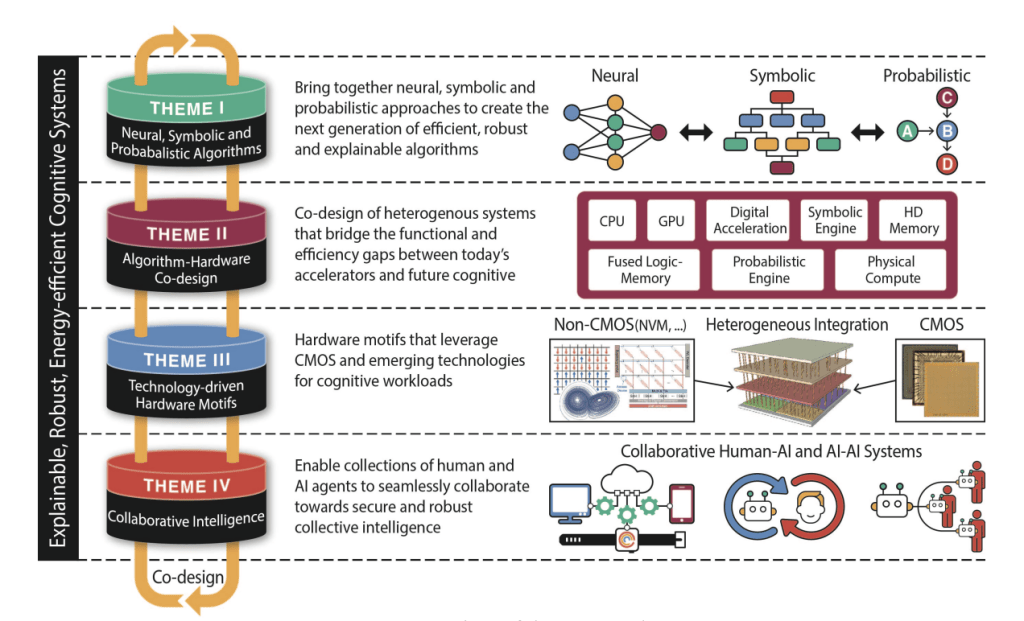About CoCoSys
CoCoSys aims to enable the next-generation of collaborative human-AI systems through synergistic advances in algorithms, hardware motifs, algorithm-hardware co-design and collective and collaborative intelligence. The center will demonstrate the impact of these advances in collaborative human-AI applications such as co-bots, future digital assistants, and mixed-reality systems. These applications are characterized by the need for real-time responses, extreme energy efficiency, explainability, and trustworthiness and will thus serve as ideal drivers for the proposed research. The innovations delivered by COCOSYS will advance the brittle and limited capabilities of current AI systems to approach the vision of digital humans augmenting biological humans as a trusted collaborator.
CoCoSys is one of seven Joint University Microelectronics Program (JUMP) 2.0 academic research centers co-sponsored by the Semiconductor Research Corporation and Defense Advanced Research Projects Agency (DARPA).
The following ten universities have come together to pursue the goals of CoCoSys:










Broadening Participation
Our Pledge: SRC Cocosys Research Center is dedicated to supporting and improving multi-level and interdisciplinary education for the future of semiconductor industry. Leveraging the resources and support from partners of SRC and our center, we are committed to broadening the participation of underrepresented students in research and educational activities across the southern regions and the whole nation.”
Research

The center’s research is organized into the following themes: Click the theme title for more information about each theme and its researchers.
NEURAL, SYMBOLIC, AND PROBABILISTIC ALGORITHMS.
Theme 1 will create the next generation of explainable algorithms, expand the scope of neuro-inspired algorithms from perception to reasoning and decision-making, and uncover the fundamental accuracy-robustness-efficiency tradeoffs in cognitive systems. Theme 1 focuses on the following tasks:
- Unifying Neural, Symbolic, and Probabilistic Models
- Hyper-dimensional (HD) Information Representations & Processing
- Computing with Emergent and Dynamical Systems
- Theoretical Underpinnings of Robustness-accuracy-efficiency Tradeoffs
HARDWARE ALGORITHM CO-DESIGN
Theme 2 will distill the key computational characteristics of future cognitive workloads developed by Theme 1 and use them to drive the design of the next generation of programmable hardware architectures for cognitive computing. This theme will play a key role in ensuring that the developed algorithms are well-matched to the proposed hardware fabrics and vice-versa. Theme 2 focuses on the following tasks:
- Architectures for Neuro-symbolic-probabilistic Workloads
- Full-stack Optimization and Software Frameworks for Cognitive Systems
- Technology and Integration-driven Cognitive Architectures
- Computing with Emergent and Dynamical Systems
TECHNOLOGY-DRIVIN HARDWARE MOTIFS
Theme 3 will design the building blocks of future cognitive hardware platforms by matching the unique capabilities of various CMOS and beyond-CMOS devices and integration technologies to the needs of the workloads, seeking quantum improvements in energy efficiency and performance. Theme 3 focuses on the following tasks:
- Digital, Mixed-signal, and Mixed-mode Cognitive Circuits
- Technology (Logic, Memory, Interconnect) Evaluation
- Heterogeneous Integration-Driven Cognitive HW Design
- Hardware Prototyping and Benchmarking
COLLABORATIVE INTELLIGENCE
Theme 4 will specifically focus on the challenges involved in collections of AI agents and how AI agents interact with humans. Theme 4 focuses on the following tasks:
- Digital, Mixed-signal, and Mixed-mode Cognitive Circuits
- Technology (Logic, Memory, Interconnect) Evaluation
- Heterogeneous Integration-Driven Cognitive HW Design
- Hardware Prototyping and Benchmarking

Spotlight on Innovation
Meet the Pioneering Students of CoCoSys at Georgia Tech
Discover the remarkable achievements and groundbreaking projects of our talented students at CoCoSys, Georgia Tech. From innovative research to real-world applications, these pioneers are shaping the future of cyber-physical systems with their dedication and ingenuity.

Spotlight on Research
Learn about research coming out of CoCoSys at Georgia Tech.
Explore the extraordinary accomplishments and pioneering projects of our brilliant students at CoCoSys, Georgia Tech. Their innovative research and practical applications are transforming the landscape of cyber-physical systems, driven by their dedication and creativity.
Recent News
Contact Us
CoCoSys is located in the Department of Electrical and Computer Engineering at the Georgia Institute of Technology in Atlanta, GA. For additional information about the center, please contact Emily.Watson@ece.gatech.edu.
Office
Center for the Co-Design of Cognitive Systems
777 Atlantic Drive NW
Atlanta, GA 30332-0250
Via Email
Emily Watson
ewatson63@gatech.edu